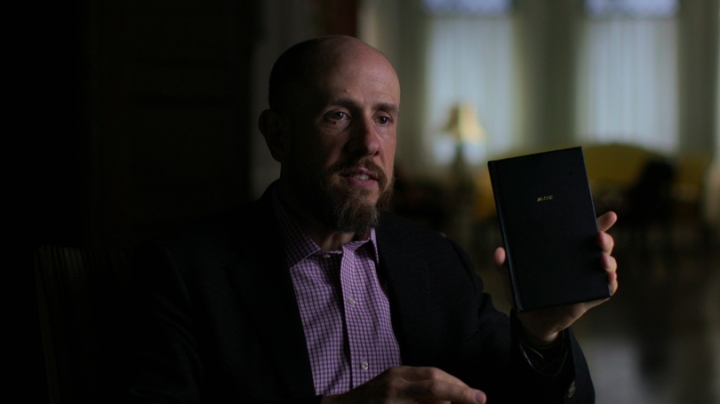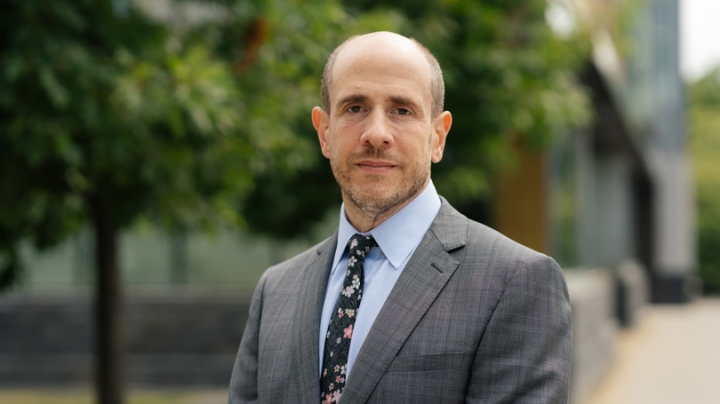It’s a first for Jeff Sharlet. The associate professor of English and creative writing, National Magazine Award-winning journalist, and author of six books is now an executive producer for a five-part Netflix documentary adaptation of his 2008 nonfiction bestseller, The Family, which will be released for streaming on Aug. 9.
Both The Family and Sharlet’s 2010 follow-up, C Street, shed light on a secretive Washington, D.C.-based Christian organization whose theology emphasizes networks of the powerful—including senators, congressmen, presidents, and other world leaders. Its activities range from organizing the annual National Prayer Breakfast to lobbying for anti-LGBTQ laws in Uganda and Romania.
The Netflix series, also titled The Family, is an original production directed by Jesse Moss that draws from Sharlet’s books as well as new research.
“It’s their story based on my two books. They were like, this is a treasure trove of source material,” Sharlet says. “I made my whole research archive—boxes and boxes of stuff that nobody else has—available to them, and pointed them toward other people to talk to.”
Sharlet didn’t originally set out to write two books—much less a TV adaption—about the Family, he says. He first learned about the group while researching an earlier project on religious life in America. For that essay collection (Killing the Buddha, coauthored with Peter Manseau), he says, “I was just wandering the country joining odd religious groups and writing about it. I was willing to join anything—it’s what I was doing at the time. So I joined the group. I had no idea what they were. And then when I saw what an astonishing thing it was, I went back to do further reporting.”

The Netflix series features interviews with Sharlet as well as members of the Family. “I give a lot of credit to Jesse Moss, not least of all because he got lots of people from the Family to talk on camera, which hasn’t happened before,” Sharlet says.
The production uses actors to dramatize scenes from the book, including Sharlet’s experiences as a young writer first encountering the group. “I’m sort of the talking head who guides you through, and then there’s an actor who plays a 30-year-old me,” he says. “That’s when I had hair—so the actor is pretty close. The first episode is largely a dramatization of the first chapter of the book.”
There is also a dramatized scene from Sharlet’s childhood, meant to illustrate where his fascination with religion originates.
Of collaborating with filmmakers, Sharlet says, “The books are creative nonfiction, and part of what I love about Jesse Moss’ direction is that he gets this. They spent a long time thinking about how to tell this story. It’s hard, because you can’t embed with the organization, so you can’t do a cinema verité; there are talking heads, but not enough to tell the full story. So you have to use archival footage and dramatizations and put it all together.”
Sharlet found working in a different medium opened up new possibilities for his storytelling. “There were things I couldn’t do in the book that I was excited to do on film,” he says.
And adapting the much larger project of The Family for the screen has helped him think about how to compress complex material in the smaller format of his forthcoming book, This Brilliant Darkness: A Book of Strangers. That project, which will be published in February 2020, developed from a series of Instagram photo-essays Sharlet has been writing and compiling for the past several years that explore “the varieties of poverty—ordinary, extraordinary, spiritual, and so on.”
“I love cabinets of curiosity—books that are strange and move by weird digression,” he says. “The Family is a big sprawling book, but This Brilliant Darkness is a book that’s moving in small pieces. You can’t approach it from the perspective of what am I going to chop—you have to start with a blank slate and say, ‘Ok, here’s this small space, what can I put in it?’ In that compression you find sort of the possibility of an infinitude of stories to be told.”
The TV project is also influencing his thinking about teaching. “The disciplinary boundaries that served effectively for a long time” may be limiting, he says. “We see students all the time who are interested in documentary arts, but they don’t want to just write. If you want to do a real nonfiction program, you’re probably taking writing courses with me, and then film and media courses, and often courses in environmental studies and anthropology.”
He envisions a time when these students can learn about podcasts and streaming media in addition to writing. “There are traditionalists who say writing students should only study writing. But why would we not look at other media to help us think about storytelling?”
Hannah Silverstein can be reached at hannah.silverstein@dartmouth.edu.


